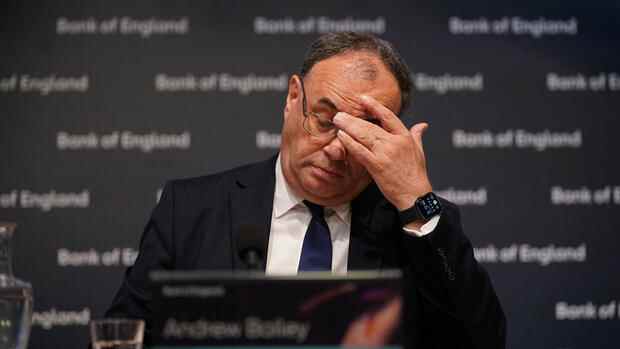In addition to the high energy costs, inflation in the summer was mainly driven up by rising food prices. Food is almost 13 percent more expensive than a year ago.
The renewed surge in inflation puts both the Bank of England (BoE) and the next prime minister under enormous pressure to act. The financial markets are already betting that the British central bank will hike interest rates again by 50 basis points at its next meeting in September. Former central banker Andrew Sentance expects interest rates in Great Britain to rise to four percent by the end of the year. The current interest rate is 1.75 percent.
The BoE only raised the interest rate mark by half a percentage point at the beginning of June in order to get inflation under control. At the same time, the central bank predicted a recession that could last until early 2024.
Top jobs of the day
Find the best jobs now and
be notified by email.
Central bankers expect consumer prices to continue rising in the coming months, peaking at around 13 percent. The central bank’s inflation target is two percent.
Conservative politicians accuse central bank chairman Andrew Bailey of failing to fight inflation and are calling for the central bank’s mandate to be reviewed. Bailey, in turn, blames global factors such as the delivery bottlenecks after the pandemic and the war in Ukraine for the surge in inflation. In contrast, the Bank of England is powerless.
The price increase is also reflected in services
In fact, more than half of the price increases are being driven by rising energy and food costs. However, the sharp rise in prices in restaurants and hotels shows that inflation is also taking hold in the service sector.
Meanwhile, the next prime minister is under increasing pressure to use state aid to reduce the rapidly rising cost of living. However, Liz Truss, the favorite for the presidency of the Conservative Party and thus for moving into the seat of government at 10 Downing Street, has so far refused to help the suffering Brits with direct financial aid. The incumbent foreign minister is opting for tax cuts instead.
The Tories want to determine Boris Johnson’s successor by September 5. Labor Party leader Keir Starmer called for a freeze on energy prices on Monday.
“There will be an emergency budget,” announced Sajid Javid. The former finance minister supports Truss and did not want to rule out short-term aid for low-income families.
Only the prices for clothing and shoes fell in a monthly comparison.
(Photo: AP)
In May, the Johnson government decided on emergency aid of around 15 billion pounds (about 17.7 billion euros). The renowned Institute for Fiscal Studies (IFS) in London has calculated that another £12 billion would be needed to fulfill the aid promises.
The reason: inflation has further increased the need. The growing need for finance could also throw the recently consolidated state budget back into trouble.
“We recognized the risks of inflation far too late,” said Stuart Rose, the former head of the retail group Marks & Spencer, to the BBC radio station. The top manager criticized the political leadership vacuum in London: “We cannot wait for an emergency budget in December, we must do something now.”
He disagreed with Truss’ plan to fight inflation through a supply-side growth policy. “We cannot outgrow inflation. You have to kill the evil first.” It won’t always be fair.
Inflation pushes real wages to their lowest level in 20 years
The UK labor market shows just how unfair inflation is. According to the ONS, real wages fell by three percent in the second quarter, the sharpest decline in 20 years. And this despite the fact that the nominal wage increases, averaging almost five percent, are well above the level that is compatible with the inflation target of the central bankers.
The reason for this is that the much higher inflation rate wipes out wage increases and makes workers poorer. They react to this with higher wage demands and strikes. With UK unemployment at 3.8% still near its historic low and nearly 1.3 million unfilled jobs, unions have a good chance of getting their demands through.
“The danger is that the high wage increases will further fuel inflation,” warned Sentance, now an economist who advises the think tank Cambridge Econometrics. The BoE reacted far too late and is now chasing developments.
“Something went wrong,” Economics Minister Kwasi Kwarteng recently criticized the Bank of England. The truss pendant is traded as the next finance minister and would then have direct access to the central bank.
Unlike the ECB, for example, the government in Great Britain sets the inflation target. That would give the new government the opportunity to limit the independence of the central bank and exert more influence on its monetary policy.
More: Andrew Bailey is the man assigned to protect the “old lady”.
